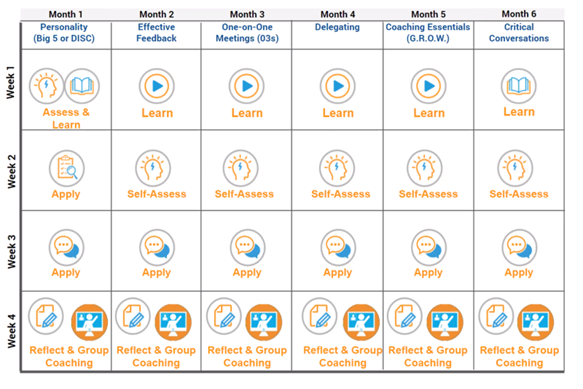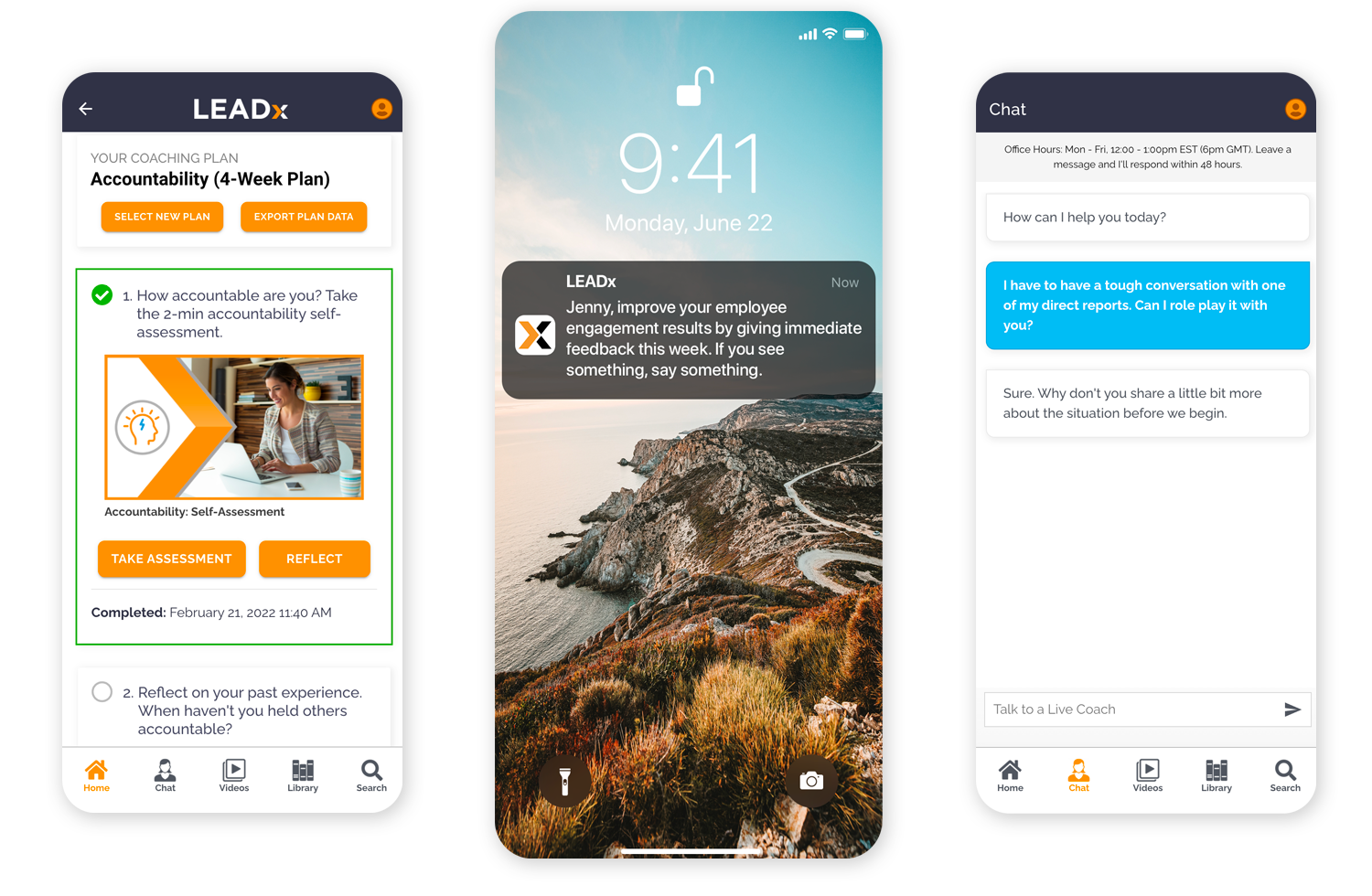
7 Ways To Leverage Management Coaching At Your Organization
Good manager development is the lever for strong employee engagement. Happy and high-performing managers improve the happiness and performance of their direct reports.
One of the most powerful ways to develop good managers is to coach them. That’s why leadership coaching, though it has been popular for a long time, only continues to grow. One recent study estimates that 54% of HR leaders plan to expand their coaching offerings through 2022.
Whether you’re looking to expand your audience to include managers for the first time, add new types of management coaching to your repertoire, or kickstart coaching for management for the first time, here are seven different ways you can coach your managers.
Reinforce Learning (Integrated Coaching)
One of the most common and effective ways to leverage leadership coaching is as follow-up to critical training. Management coaching can help managers to deepen their knowledge, put their knowledge to practice, work through speed bumps, and ultimately, to turn their knowledge into habits that last. In short, coaching helps make learning stick. Here’s an example of how we integrate coaching into our learning plans:

In this example, coaching is used after the participant has learned about and applied key concepts already. That way the group coaching session can focus on things like reflection on application, working through problems participants ran into, planning, and goal setting.
Coaching can be used as intensively as makes sense for your group and your budget. The example learning plan only uses coaching once at the end, but other programs will leverage coaching throughout a learner’s journey. It can even be used as an ongoing learning tool with the goal of helping leaders to reach their maximum potential.
Coach A Group (Peer Coaching)
Group coaching is one of the fastest-growing approaches to management coaching. Coaching groups is quickly starting to replace the traditional workshop. Traditional workshops tend to struggle with the knowing-doing gap. It’s difficult to get participants to apply what they learned in a workshop on the job. Group coaching helps address this problem because of its increased attention to application, problem-solving, and collaborative learning. Benefits of the group coaching approach include:
- Learning from peers
- Input from a more diverse set of perspectives than you get in a one-on-one
- An environment of accountability and support
- Peer coaching practice together to improve coaching skills
- Networking and making friends with peers in similar roles to you
- Cost effective (one-on-one coaching can be as expensive as $600-$10,000 per person each month)
- Helps build a culture of learning
- You can put an intact team or intact group (i.e., new managers) together
As an example, you might put a group of new managers through group coaching around how to give effective feedback. The group meets each month for three months and practices with their direct reports between sessions.
Debrief An Assessment
Coaches trained in the art of the debrief can help managers make sense of a 360 assessment. Instead of leaving it up to the employee to make sense of their results, or letting them go through it once in a classroom with a facilitator, a coach can help your manager more deeply understand their assessment results. A coach can help a manager to reflect on their assessment and see blind spots. They can also help managers sift through feedback to make sense of opportunities, areas for improvement and what parts of the report to hone in on. They can also help to guide a manager through the discomfort and pain that inevitably comes with the feedback on a 360 assessment. Lastly, a coach can help a manager think about and set high-quality goals based on their results.
For example, a manager may take a 360 leadership skills assessment. Comments about the leader’s points of weakness and areas of leadership they hadn’t even considered emerge (i.e., raters point out how they tend to stress the team out when they’re under pressure on a deadline). Without good coaching, managers may take 360 feedback and begin to ruminate or draw out excuses for their behavior. A good coach will help them reflect in a healthier, more productive way. Coaches will also help managers to see and leverage their strengths.
Additional Resource: On the Importance of Strengths-based Assessment Feedback
Address Timely Needs and Skills
In a recent interview with Alyssa Lahar, the Chief Human Resources Officer at Zoominfo, she broke down how one of the core ways that they use coaching is to address as-needed situations. As an example, she shared that when a manager is preparing to give a presentation to senior leadership for the first time, they are enrolled in coaching that’s specifically designed to help them improve their presentation skills.
Similarly, at Nestlè, employees who are promoted from individual contributor positions to management for the first time go through simulations and coaching that are specifically designed to help them practice the awkward transition to leading their peers.
A common argument against skills-based coaching is the idea that a good coach isn’t necessarily good at what they’re coaching; they’re good at the art of coaching. This is what Sir John Whitmore says in his hugely popular coaching book Coaching for Performance. But, while skills-based coaching shouldn’t replace performance coaching (which focuses on a question-based approach to unlock a manager’s potential), it can absolutely be a powerful way to rapidly improve a manager’s skills in a key area. Ideally, you can work with a coach who has both mastered the skills you seek to improve and has mastered performance coaching. That way you aren’t getting one at the expense of the other.
You can also combine skills-based coaching with coaching as reinforcement. For example, you may follow up an emotional intelligence (EQ) training program with coaching from an emotional intelligence expert. In this case, the EQ coach may take on a bit more of an instructor-based role as they not only attempt to help the coachee unlock their potential, but also seek to instruct them on best practices around applying EQ skills on the job.
Coach Managers On Coaching Skills
Coaching managers on how to coach their direct reports is an increasingly popular approach. The idea is simple. By teaching managers how to coach their direct reports, they will improve the engagement and performance of their direct reports. Integrating coaching skills into managers’ day-to-day approach helps to build a culture of coaching and learning in the process.
There’s an added benefit to using a coach to train managers in coaching skills: they get to watch and learn from the approach and skills of the coach training them.
Coaching skills for managers include skills like helping employees with their performance, helping employees reach their potential, helping employees capitalize on learning opportunities, helping employees through difficult situations, and having tough or important conversations with their employees.
Additional Resources:
The Coaching Habit by Michael Bungay Stanier breaks down seven core questions for managers to ask to adopt a coach’s approach.
Most Managers Don’t Know How to Coach People. But They Can Learn
Coach An Intact Team
The idea behind team coaching is to facilitate a team’s growth, often by focusing on helping them accomplish a specific goal together. A coach comes into the team environment and observes the team working together. The coach observes how the team interacts with one another, with others and other teams, and within the context of the greater organization. Then, the coach offers feedback and ideas for improvement based on what they observe, their experience, and their expertise. The feedback and ideas may come at the group level and they may be offered to specific individuals.
Develop Your Managers’ Managers Coaching Skills
Organizations seeking to build a culture of learning and coaching frequently roll out critical skills from top to bottom. That way managers seeking to learn how to coach better can turn to their boss, both to ask questions and to observe a role model for coaching behavior. Buy-in and application by senior leadership help build motivation and enthusiasm around learning.
Pair Coaching With Nudges To Extend Practice And Application
Whichever of the above modes of management coaching you choose to use, pair your coaching with nudges to reinforce key learnings consistently. You send out nudges around specific behaviors that managers are working with their coaches to achieve. This in turn helps solidify those behaviors as habits.

You can preview a video of how nudges work here.






